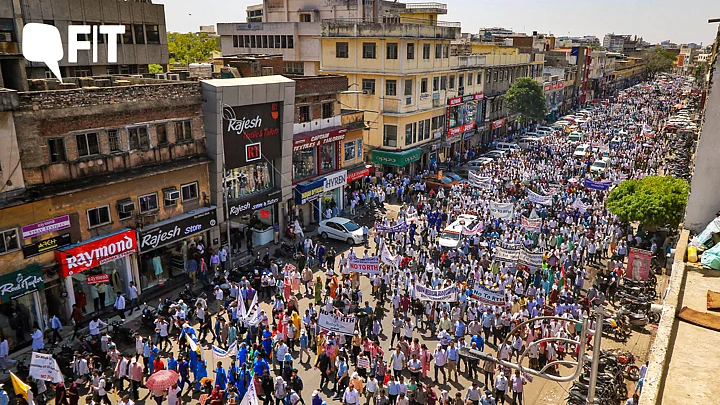Around 50,000 doctors across Rajasthan who were protesting against the newly enacted Right to Health (RTH) Act called off their two-week-long strike on Tuesday, 4 April, hours after inking a memorandum of understanding (MoU) with the state government.
But how did the doctors and the government reach a consensus?
Dr Sunil Chugh, President, IMA Rajasthan, and one of the signatories of the MoU, told FIT that now that the government has agreed to the demands, the doctors' focus "will now be on the formation of rules of the Act."
He says that the doctors want to ensure that:
It is mentioned in the rules that “emergency” is restricted to accidents, snake, and animal bites.
The paragragh on “emergency obstetric treatment and care” be removed.
Dr Rajendra Yadav, an United Private Clinics and Hospitals of Rajasthan member, agrees with Dr Chugh. He adds:
“We had demanded that the transfer facility of any emergency patient or accident victim should be through local government or SDM/Collector. The cost of treatment reimbursement must be done within 15 days through a separate portal.”
Consensus Reached Over RTH Act
The eight-point MoU highlights the demands raised by the doctors’ associations, which now the state government seems to have reached a consensus over.
According to the agreement, the health minister has agreed to exclude private multi-specialty hospitals with less than 50-beds and private hospitals established without any support from the government (in the form of land or building) from the RTH Act.
As per the MoU signed between the state government and the doctors' associations who led the protest – the Indian Medical Association (IMA), the Private Hospitals and Nursing Homes Society (PHNHS), and the United Private Clinics and Hospitals of Rajasthan (UPCHAR) – the hospitals which will be covered under the RTH Act include
Private medical college hospitals
Hospitals established on PPP mode
Hospitals run by trust
Hospitals established after being allotted land by the government on subsidised rate
“The government has agreed that while changing the rules they will consult two representatives of IMA. Another victory from the protest is that now there will be only a single window system for licenses and other approvals for hospitals. Also, the regularisation of hospitals constructed in Rajasthan shall be based on the Kota model.”Dr Vijay Kapoor, President, PHNHS, a signatory of the MoU
Strike Called Off After Over Two Weeks
A press release issued by the IMA on Tuesday evening stated:
“After signing of MOU by IMA Rajasthan State, UPCHAR, and PHNHS with the state government regarding RTH, which has excluded almost 97-98 percent of private hospitals from the ambit of RTH bill, the state working committee of IMA Rajasthan state unanimously decided to call off the strike of private hospitals of the state from 8 pm today (4 April 2023)."
In the last two weeks, private hospitals in the state remained partially closed and government doctors wore black ribbons on their arms in solidarity with the private sector.
Fighting Against RTH Since 2022
Dr Chugh told FIT, that the organisation had been pushing back against the bill since 2022 when its draft was first uploaded on the website of the Directorate of Health and Family Welfare.
"We were surprised to see that the bill was loosely drafted and opposed it. We gave our suggestions and comments to the health secretary who assured us that all our suggestions shall be taken care of before being tabled in the assembly."Dr Sunil Chugh to FIT
Continuing their agitation, the doctors' bodies demanded a select committee review the bill.
"On 11 February, after our meeting with Rajasthan Health Minister Prasadi Lal Meena, we told him that if the government doesn’t rectify the bill then we shall boycott the government’s Chiranjeevi scheme and RGHS in all the private hospitals."Dr Sunil Chugh, President, IMA Rajasthan
However, it was only after the bill was passed in the Assembly that the doctors took to the streets demanding its withdrawal.
(The author is a journalist based in Rajasthan reporting on politics, gender, human rights, and issues impacting marginalised communities. She tweets @tabeenahanjum.)

